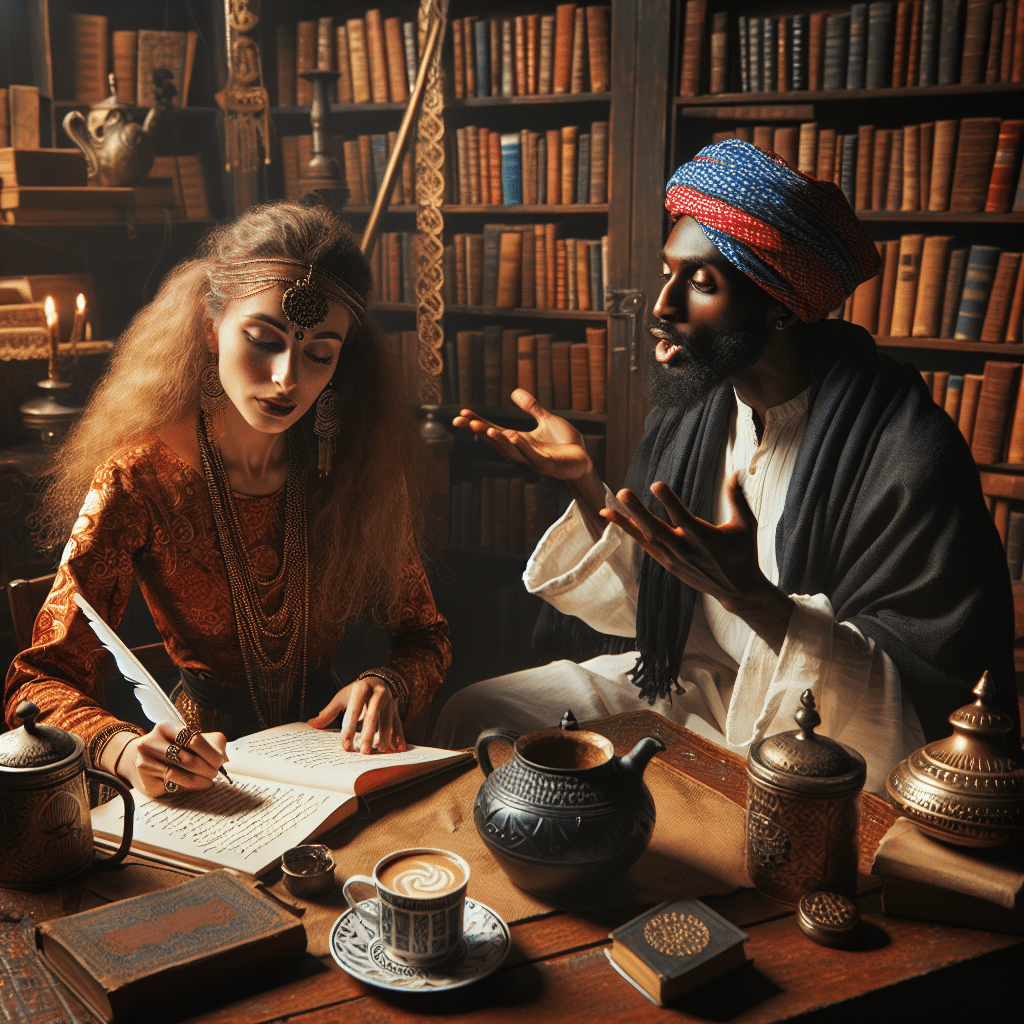-
Table of Contents
Exploring Historical Narratives: How Poetry Reflects Cultural Identity
Poetry has long been a powerful medium through which cultural identity is both expressed and shaped. Throughout history, poets have used their craft to reflect the values, struggles, and aspirations of their communities, thereby contributing to a collective sense of identity. This intricate relationship between poetry and cultural identity is evident in the way historical narratives are woven into verse, offering insights into the ethos of different societies.
To begin with, poetry serves as a repository of cultural memory. It captures the essence of historical events, preserving them for future generations. For instance, epic poems like Homer’s “Iliad” and “Odyssey” are not merely stories of heroism and adventure; they encapsulate the values and beliefs of ancient Greek society. Through these narratives, we gain an understanding of the Greek ideals of honor, bravery, and the human condition. Similarly, the works of poets such as William Wordsworth and Walt Whitman reflect the socio-political landscapes of their times, offering a window into the cultural milieu that shaped their perspectives.
Moreover, poetry often acts as a vehicle for resistance and social change. In times of oppression and turmoil, poets have used their voices to challenge dominant narratives and advocate for marginalized communities. The Harlem Renaissance, for example, was a cultural movement in the early 20th century where African American poets like Langston Hughes and Claude McKay used their work to assert their identity and resist racial discrimination. Their poetry not only highlighted the struggles faced by African Americans but also celebrated their rich cultural heritage, thereby fostering a sense of pride and solidarity within the community.
In addition to reflecting historical events and social movements, poetry also plays a crucial role in preserving linguistic heritage. Language is a fundamental aspect of cultural identity, and through poetry, dialects and vernaculars are kept alive. The works of poets such as Robert Burns in Scotland and Federico García Lorca in Spain are prime examples of how regional languages and dialects are immortalized through verse. By writing in their native tongues, these poets ensure that their linguistic traditions are passed down through generations, thus maintaining a vital link to their cultural roots.
Furthermore, poetry has the unique ability to transcend temporal and spatial boundaries, allowing for a dialogue between different cultures and eras. The translation of poetic works enables cross-cultural exchanges that enrich our understanding of diverse cultural identities. For instance, the translation of Rumi’s Persian poetry into various languages has introduced countless readers to Sufi philosophy and Islamic mysticism. This cross-pollination of ideas fosters a greater appreciation for the richness and complexity of different cultural traditions.
In conclusion, poetry is an indispensable tool in shaping and reflecting cultural identity. It captures historical narratives, serves as a form of resistance, preserves linguistic heritage, and facilitates cross-cultural dialogue. Through its evocative language and profound insights, poetry offers a unique lens through which we can explore the multifaceted nature of human experience. As we continue to navigate an increasingly globalized world, the role of poetry in shaping cultural identity remains as vital as ever, reminding us of our shared humanity while celebrating our diverse cultural landscapes.
The Influence of Poetic Traditions on Modern Cultural Identity
Poetry, as an art form, has long been a vessel for expressing the deepest emotions and thoughts of individuals and communities. Its influence on cultural identity is profound, as it encapsulates the essence of a society’s values, struggles, and aspirations. The poetic traditions that have been passed down through generations serve as a bridge between the past and the present, allowing modern societies to connect with their historical roots while also evolving in response to contemporary experiences.
One of the most significant ways in which poetry shapes cultural identity is through its ability to preserve language and dialects. In many cultures, poetry is not merely a form of artistic expression but also a means of safeguarding linguistic heritage. For instance, the oral traditions of indigenous communities often rely heavily on poetry to transmit knowledge, history, and cultural practices. These poetic forms, whether in the form of songs, chants, or spoken word, ensure that the nuances of language are maintained and celebrated. Consequently, they play a crucial role in fostering a sense of belonging and continuity within these communities.
Moreover, poetry often serves as a reflection of societal values and collective consciousness. Through the exploration of themes such as love, justice, freedom, and identity, poets articulate the shared experiences and aspirations of their people. This reflective quality allows poetry to act as a mirror to society, offering insights into the prevailing cultural norms and ideologies. For example, the works of poets like Langston Hughes and Maya Angelou have been instrumental in highlighting the African American experience and advocating for civil rights. Their poetry not only captures the struggles and triumphs of their community but also inspires future generations to continue the fight for equality and justice.
In addition to preserving language and reflecting societal values, poetry also has the power to challenge and transform cultural identity. Poets often push the boundaries of conventional thought, questioning established norms and proposing new ways of understanding the world. This transformative potential is evident in the works of contemporary poets who address issues such as gender identity, environmentalism, and globalization. By bringing these topics to the forefront, poets encourage their audiences to reconsider their perspectives and embrace more inclusive and progressive identities.
Furthermore, the global exchange of poetic traditions has enriched modern cultural identities by fostering cross-cultural understanding and appreciation. In an increasingly interconnected world, poets draw inspiration from diverse sources, blending traditional forms with contemporary influences. This fusion creates a dynamic and evolving poetic landscape that reflects the complexities of modern life. For instance, the incorporation of haiku into Western poetry or the influence of Sufi mysticism on contemporary verse exemplifies how poetic traditions transcend geographical boundaries and contribute to a more nuanced cultural identity.
The role of poetry in shaping cultural identity is multifaceted and enduring. It preserves linguistic heritage, reflects societal values, challenges established norms, and fosters cross-cultural exchange. As societies continue to evolve, poetry remains a vital force in articulating the collective consciousness and aspirations of communities around the world. By engaging with poetic traditions, individuals can gain a deeper understanding of their cultural roots while also embracing the transformative potential of this timeless art form. In doing so, they contribute to the ongoing dialogue that defines and redefines cultural identity in an ever-changing world.
Poetry as a Tool for Preserving and Transmitting Cultural Heritage
Poetry has long been a powerful medium for preserving and transmitting cultural heritage, serving as a repository of collective memory and a conduit for cultural expression. Through its unique ability to encapsulate the essence of a community’s values, beliefs, and experiences, poetry plays an instrumental role in shaping cultural identity. This literary form, with its rhythmic cadence and evocative language, transcends mere words to become a living testament to the traditions and histories of diverse cultures.
One of the most compelling aspects of poetry is its capacity to distill complex cultural narratives into accessible and memorable forms. By employing metaphor, symbolism, and allegory, poets can convey profound truths about their societies, often encapsulating centuries of wisdom in a few succinct lines. This economy of expression not only makes poetry an effective tool for education but also ensures that cultural knowledge is passed down through generations. In many indigenous cultures, oral poetry has been the primary means of preserving historical events, moral lessons, and communal values. These poetic traditions serve as a bridge between the past and the present, allowing contemporary audiences to connect with their ancestral heritage.
Moreover, poetry’s emotive power enables it to resonate deeply with individuals, fostering a sense of belonging and identity. When people encounter poems that reflect their own experiences and cultural backgrounds, they often feel a profound connection to their heritage. This emotional resonance can be particularly significant for diasporic communities, who may be geographically distant from their cultural roots. Through poetry, these individuals can maintain a link to their homeland, preserving their cultural identity even in the face of displacement and assimilation.
In addition to its role in preserving cultural heritage, poetry also acts as a dynamic force for cultural transmission. As societies evolve, so too do their poetic traditions, adapting to new contexts while retaining core elements of their original identity. This adaptability allows poetry to remain relevant across different eras and social landscapes. For instance, contemporary poets often draw upon traditional forms and themes while infusing their work with modern sensibilities and concerns. This synthesis of old and new not only revitalizes the poetic tradition but also ensures that it continues to reflect the lived realities of its audience.
Furthermore, poetry’s inherent flexibility makes it an ideal medium for cross-cultural exchange. Poets frequently engage with influences from other cultures, incorporating diverse perspectives into their work. This intercultural dialogue enriches the poetic tradition, fostering mutual understanding and respect among different communities. By celebrating both the uniqueness and universality of human experience, poetry helps to build bridges between cultures, promoting a more inclusive and harmonious global society.
In conclusion, poetry serves as both a guardian and a transmitter of cultural heritage, playing a vital role in shaping cultural identity. Its ability to encapsulate complex narratives, evoke deep emotional responses, and adapt to changing contexts ensures that it remains a powerful tool for preserving and transmitting cultural knowledge. As societies continue to evolve, poetry will undoubtedly remain a cherished medium for expressing the rich tapestry of human experience, connecting individuals to their past while guiding them toward a shared future. Through its timeless beauty and profound insights, poetry will continue to illuminate the path of cultural continuity and transformation.
Q&A
1. **Question:** How does poetry contribute to the preservation of cultural heritage?
**Answer:** Poetry captures and conveys the traditions, values, and historical experiences of a culture, helping to preserve its heritage for future generations.
2. **Question:** In what ways can poetry influence national identity?
**Answer:** Poetry can evoke a sense of shared history and collective memory, fostering a sense of unity and pride among members of a nation.
3. **Question:** How does poetry serve as a medium for marginalized voices within a culture?
**Answer:** Poetry provides a platform for marginalized groups to express their experiences, challenges, and perspectives, thereby enriching the cultural narrative and promoting inclusivity.
Conclusion
Poetry plays a crucial role in shaping cultural identity by encapsulating the values, beliefs, and experiences of a community. It serves as a medium for expressing collective emotions, preserving historical narratives, and fostering a sense of belonging. Through its unique use of language and symbolism, poetry can challenge societal norms, inspire change, and bridge generational gaps. Ultimately, poetry not only reflects but also actively constructs and redefines cultural identity, making it an indispensable element in the tapestry of human expression.

